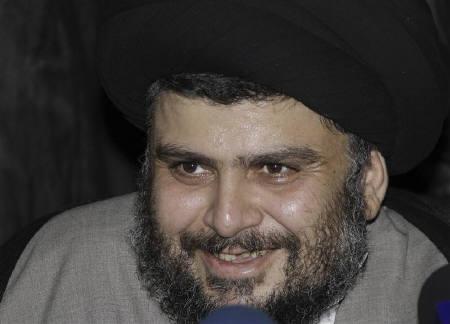Support for Iraqi rejection of anti-LGBT attacks
Colin Stewart is a 45-year journalism veteran living in Southern…
Human Rights Watch has endorsed Iraqi Shiite clergyman Muqtada al-Sadr’s call for an end to violence against sexual minorities, reported last month on this blog. HRW issued this press release:
Iraq: Cleric’s Call Against Anti-LGBT Violence
Fighters Should Heed al-Sadr’s Statement; Government Should Follow Suit

(Beirut, August 18, 2016) – State and non-state actors in Iraq should heed the prominent Shia cleric Moqtada al-Sadr’s July 2016 statement banning violence against those who do not conform to gender norms, Human Rights Watch said today.
Since early 2009, Human Rights Watch has documented kidnappings, executions, and torture by militia groups, including al-Sadr’s Mahdi Army, of gay men and men perceived to be gay. The killings have continued unabated.
“Finally, the head of one of the groups whose members have carried out serious abuses against lesbian, gay, bisexual and transgender (LGBT) people in Iraq is condemning these heinous attacks,” said Joe Stork, deputy Middle East director at Human Rights Watch. “We hope this will change behavior in successors to the Mahdi Army and other ranks, and spur the government to hold accountable those who commit these crimes.”
A Human Rights Watch report found that in early 2009, Iraqi militia members began a wide-reaching campaign of extrajudicial executions, kidnappings, and torture of men suspected of homosexual conduct, or of not conforming to masculine gender norms, and that Iraq authorities did nothing to stop the killings. The killings began in the Baghdad neighborhood of Sadr City, a Mahdi Army stronghold, and were then replicated by members of militia groups in many cities across Iraq. Mahdi Army spokesmen promoted fear about the “third sex” and the “feminization” of Iraqi men, as well as suggesting that militia action was the remedy.
In 2012, militia members opened a second wave of attacks on people categorized as part of the “emo” subculture, styles that critics associated with heavy metal music, and rap. In early February 2012, signs and fliers appeared in the Baghdad neighborhoods of Sadr City, Hayy al-Habibiyya, and Hayy al-‘Amil that threatened people by name with “the wrath of god” unless they cut their hair short, concealed their tattoos, maintained “complete manhood,” and stopped wearing so-called “satanic clothing.” Similar posters appeared in other neighborhoods, also listing names.

In the following weeks, Human Rights Watch received reports of several dozen youths killed as part of the campaign. While it was unclear who was behind the campaign, at the time al-Sadr called the targets of the campaign “crazy fools” and a “lesion on the Muslim community” in an online statement, but also maintained that they should be dealt with “within the law.”
In a 2015 report, the Iraqi group Iraqueer and the US-based organization OutRight Action International (formerly the International Gay and Lesbian Human Rights Commission) documented the kidnapping and murders of gay men by members of Iraqi militia groups, including the Brigades of Wrath (Saraya al-Ghadhab) and League of the Righteous (Asa’ib Ahl al-Haqq) between 2009 and 2015. The groups condemned the Iraqi government for “stand[ing] by and allow[ing] murderous hate violence to occur, fully aware of what is happening.”
The government responded by establishing an LGBT committee in late 2012 to address abuses against the LGBT community. However, LGBT activists in Baghdad have told Human Rights Watch that this committee has taken few tangible steps to protect LGBT people. In addition, a member of the committee said, two of the original nine members vanished in 2015 in what he believed was related to their role on the committee. The committee has had no news of them since. Other members have left the committee without explanation, he said, leaving only four remaining.

With the rise of the extremist group Islamic State, also known as ISIS, gay men, transgender women, and gender non-conforming people are at even greater risk. The group has executed a number of people accused of sodomy or perceived to be gay.
While Iraq’s Penal Code does not directly criminalize same-sex intimacy, article 394 criminalizes extra-marital sexual relations. That provision effectively criminalizes all same-sex relations, since the law does not provide for same-sex marriage.
Al-Sadr’s July 7 2016, statement expresses his view that same-sex relationships and cross-dressing are not acceptable, but that gender non-conforming people – whom al-Sadr claims are suffering from “psychological problems” – nevertheless deserve the right to live. “[You] must disassociate from them [but] not attack them, as it increases their aversion and you must guide them using acceptable and rational means,” the statement read.
Despite the lack of full tolerance in al-Sadr’s statement, his call to end violence against LGBT people is an important step, Human Rights Watch said. He should ensure that those in the ranks of the militia under his command, the Peace Brigades (Saraya al–Salam), obey the order and should hold accountable commanders who do not.
Iraq’s government should take its own measures to ensure that attacks on LGBT people are punished, and the LGBT committee should actively monitor and report on human rights abuses against LGBT people and advise the government on concrete steps to protect LGBT people from violence and discrimination. Iraq’s legislature should quickly decriminalize extra-marital sexual relations.
“While al-Sadr is still a long way from fully embracing human rights for LGBT people, his statement shows that he understands the importance of stopping abuses against them,” Stork said. “The statement represents an important change in the right direction, and should be followed by concrete actions to protect LGBT people from violence.”
For more Human Rights Watch reporting on Iraq, please visit: https://www.hrw.org/middle-east/n-africa/iraq
Related articles on this blog:
- Tiny steps forward by Islamic leaders in Pakistan, Iraq (July 2016, 76crimes.com)
- Exposing persecution of LGBT individuals in Iraq (November 2014, 76crimes.com)
- Iraq has become a death trap for gay men (September 2012, 76crimes.com)


